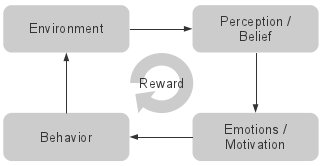Cognitive behavioral therapy and its problems
I’ve written before about Cognitive Behavioral Therapy and how I work. I consider CBT important and effective, as far as I know.
I wrote about how similar the model at its foundation is to my Model. Specifically, compare this representation of the CBT model
 with this representation of mine
with this representation of mine
Pretty similar:
- Situation -> thought -> feeling -> action
- Environment -> belief -> emotion -> behavior
I’ve also written about shortcomings of CBT — mainly that it doesn’t say where its model comes from, at least not that I’ve found, and that it doesn’t apply it to healthy people.
A problem with not saying where the model comes from is that it makes it inaccessible to average people. When I thought about writing this post, I was going to note that I’m not a psychologist or psychiatrist, I don’t have that training, and so on. I was also going to note that my PhD in science does tell me something about what they have to go through to get their degrees, at least the parts all science PhDs have in common. And I have that common experience, not just knowledge.
But, especially with my recent Vince Lombardi post, I have to remember how many other forms of motivation and types of motivational people there are. What do psychology and psychiatry do if not motivate people to change their lives? Well, coaches (sports coaches as well as executive, life, and other types of coaches), managers, and leaders of all types motivate people to change their lives.
An education in the science of psychology or psychiatry prepares you to help people in some ways but not others. As a holder of a science PhD who has worked outside science, I’m less convinced of how effectively academia prepares people to do things outside academia. (I still respect people who advance the fields highly.) Meanwhile, other people outside academia can become very effective at helping people change their lives — Vince Lombardi being one example. I might not suggest sports coaches to help people that CBT practitioners help, but that doesn’t mean they’re necessarily better.
Psychology and psychiatry may be helpful for many people, but unhelpful for others. For some reason most CBT practitioners don’t share their techniques the way coaches do. The jargon I see in their papers puts barriers between themselves, people they want to help, and others who could help them. The impenetrable name alone –Â cognitive behavioral therapy — clocking in at ten syllables, communicates many problems with how practitioners do their craft
- The name is too long for even them to type or say
- Besides its length, the name doesn’t help people understand it. Can you tell what “cognitive behavioral therapy” means from the name?
- The name relates to old branches of psychology instead of what it does, which makes it meaningful more to researchers than the people it’s supposed to help and their friends and loved ones.
- When you make something more helpful to researchers and practitioners than for the people it’s supposed to help, it suggests the field has its interests at heart more than its clients’.
The funny thing is that CBT seems helpful. I certainly think so, as I’ve been practicing something so similar with such success. To the extent practitioners want to help people, hiding their practices behind jargon retards them. I would think they’d want to make the theory and practice as accessible as possible.
I expect they would say that used wrongly it could worsen some people’s situations. If so, I would find such claims extremely dubious. We’re talking about talking to people, asking them questions, suggesting different ways of looking at things, trying out new beliefs. In my book, this describes being friendly, or at least something friends can do. And since we’re also talking about helping people who might not come to them, if you don’t make the information accessible, you deny its use to people who don’t find you or have the resources to use you.
If CBT is so effective, why not make it accessible to many people and suggest applying it to anyone wanting to improve their lives? I hope they don’t suggest practicing their craft is dangerous in the wrong hands. The stuff it suggests doesn’t require extensive training to get it right. If they publicized it more it could help more people.
Maybe getting the information out from academia to regular life just takes time. Maybe I’m a part of that process.
Read my weekly newsletter

On initiative, leadership, the environment, and burpees

Pingback: Cognitive behavioral therapy and its problems, part 2 » Joshua Spodek